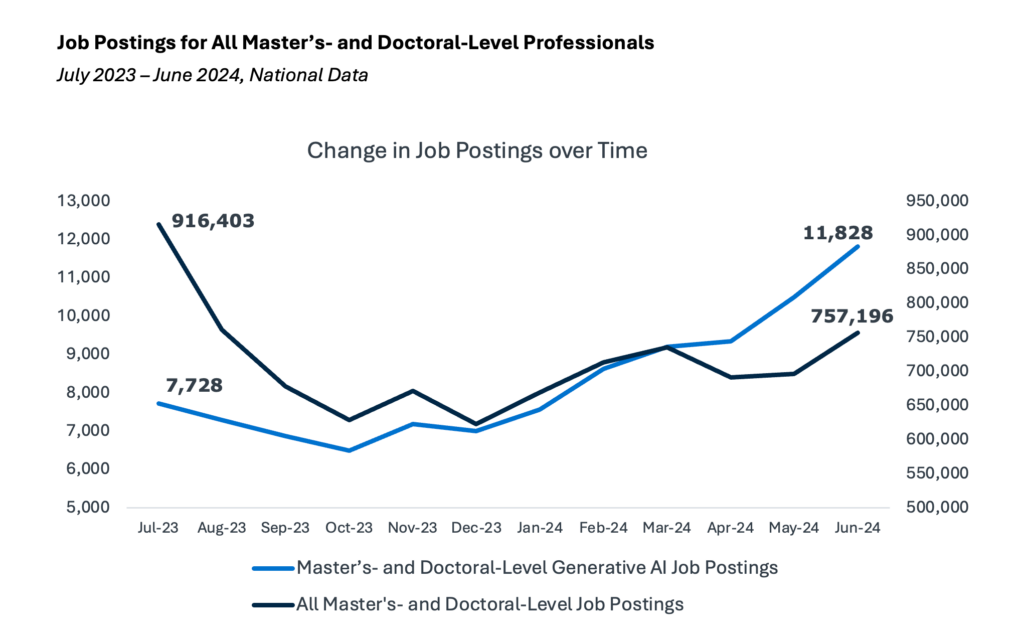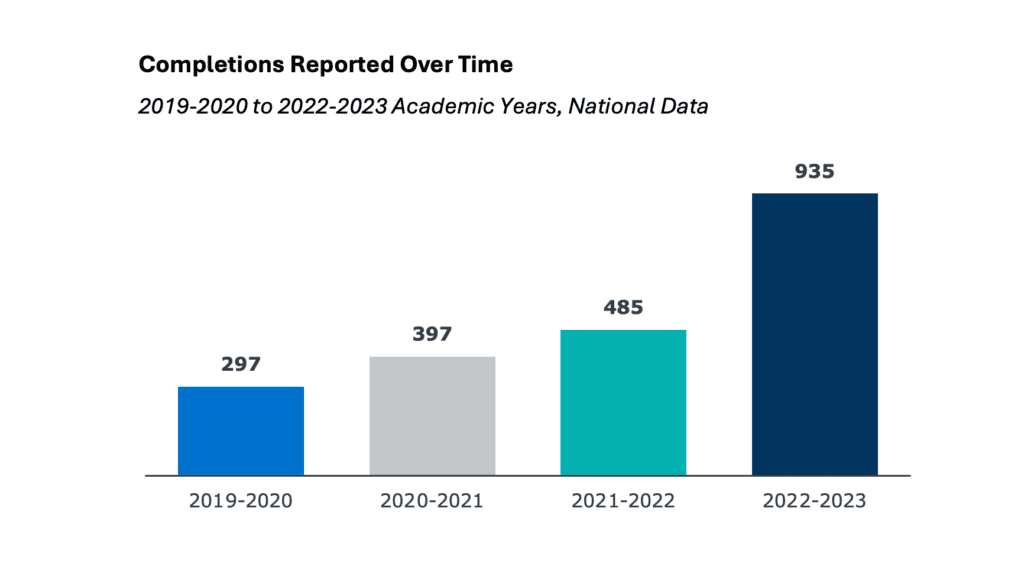Prepare your students to meet the demand for generative AI-related jobs
By Andrew Gonzalez
Generative AI broke the mold for technology adoption as seen by ChatGPT’s astonishing 100 million users in two months post-launch. This doesn’t come as much of a surprise to me as I see commercials, online ads, news articles, and social media posts about AI daily, and I’m sure you’ve seen them too.
But is there a rising demand for workers with generative AI-related skills, or is it all hype? Let’s look at the data. Between July 2023 and June 2024, national job postings for master’s- and doctoral-level professionals declined by over 17% overall, while job postings with generative AI-related skills increased by over 50% within the same timeframe.
We defined generative AI-related job postings as those seeking relevant skills such as:
- Generative Artificial Intelligence
- Natural Language Generation
- ChatGPT
We used Lightcast’s Analyst tool to collect and analyze job postings seeking these relevant skills and either a master’s or doctoral degree.

Additionally, generative AI is projected to change work activities in occupations such as software developer, computer systems analyst, and data scientist. Workers already in these occupations may seek to gain new/relevant skills as their careers increasingly require use of generative AI, especially considering adults learners’ top reason for furthering their education is career advancement.
We are not only seeing an increase in employer demand for AI skills, but also student demand for AI programs. Between 2020 and 2023, reported master’s-level completions for Artificial Intelligence programs increased from 297 to 935, a 215% increase. Based on this data, demand for learning AI skills appears to be growing.

Offer Flexible, Generative AI-Related Programming
Professional, continuing, and online leaders should partner with their Computer Science and Engineering departments to offer flexible, generative AI-related program options (e.g., part-time, online, evening courses) to accommodate adult learners’ personal and professional responsibilities, as some leaders in the space have already begun doing.
- Carnegie Mellon University: CMU offers a graduate certificate in generative AI designed to accommodate working professionals’ schedules with a 100% online modality and weekly evening courses.
- Purdue University: Purdue offers a generative AI bootcamp designed specifically for in-seat technology leaders and executives via online and self-paced courses.
The market data and programming examples I’ve shared target one type of generative AI worker that we’ve identified in our research: The AI Visionary.
-
The AI Visionary
- ~5% of knowledge-sector jobs will be advanced level
- Designs novel AI algorithms, optimizes model architecture, parameters, and neural networks
- Approaches AI with original ideas and imagination, a futurist thinker
-
The AI Manipulator
- ~25% of knowledge-sector jobs will be intermediate level
- Can train AI models on sample data and can fine tune AI models for particular uses
- Understands learning tasks, can oversee the deployment of AI within a company
-
The Common AI User
- ~70% of knowledge-sector jobs will be basic level
- Understands basic AI concepts
- Has used AI through consumer apps and user-friendly large language models
AI visionaries are those using AI to design new tools, a small but critical portion workforce. Partnering with your Computer Science and Engineering departments already offering technical generative AI-related skills provides an opportunity to serve emerging demands and grow your professional and adult education portfolio. Meanwhile, the AI Manipulator and the common AI User understand and use AI to assist with and complete tasks more efficiently.
More Blogs

The big bets that actually drive online enrollment growth

How to use state demand data to launch or revitalize programs
